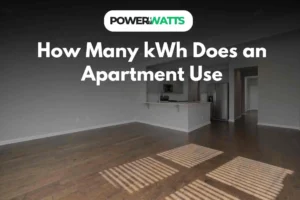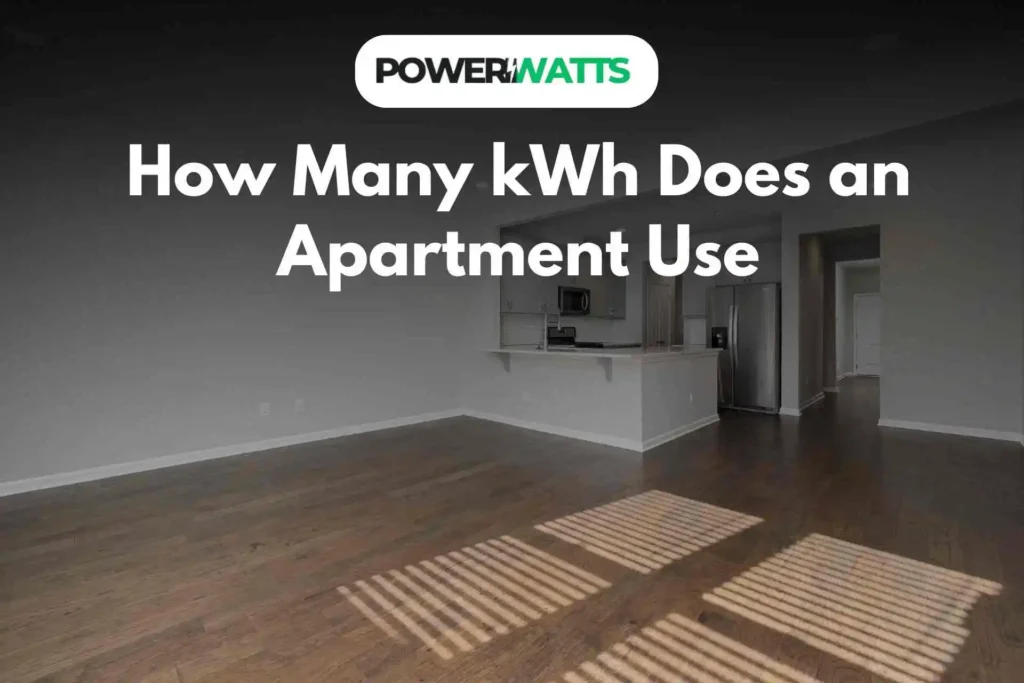Estimating how many kwh does an apartment use uses is of importance both to the tenant and to the property owner. Whether you want to budget your utility costs, reduce your carbon footprint, or assess whether it’s viable to install solar panels, knowing how many kilowatt-hours the average apartment consumes will go a great deal of distance in many ways.
This article looks at the factors that dictate energy use in an apartment, describes typical usage ranges, and offers some advice on ways to reduce electricity consumption.
What is a Kilowatt-Hour (kWh)?
The very core of energy usage—in other words, understanding what a kilowatt-hour is. A kilowatt-hour defines the quantity of electricity used by an appliance or a household over time. One kilowatt-hour translates to using 1,000 watts of power for one hour.
Example:
- Running a 100-watt light bulb for 10 hours uses 1 kWh.
- Operating a 1,000-watt appliance for one hour consumes 1 kWh.

How Many Kwh Does an Apartment Use: Typical Consumption
The actual average energy consumption of an apartment depends to a great extent on the size of the apartment, the number of occupants inside it, the nature and types of appliances used, and even the local climate. However, estimation of normal ranges of kWh consumption is quite possible for differently sized apartments.
Efficiency/One Bedroom:
Average Use: 300-5500 kWh a month
Studio and one-bedroom apartments are usually the lowest in energy consumption, as there are not so many occupants to occupy a small space. Energy consumption in these kinds of apartments is primarily grounded on lighting, heating or cooling, and simple appliances like a refrigerator, microwave, and maybe a washer/dryer.
Two-Bedroom Apartment:
Average Consumption: 500-8800 kWh per month With more square footage to consider, often with two bedrooms in an apartment, the consumption of energy can often be greater compared to smaller units. Secondly, there may also be more residents living in a two-bedroom apartment, which in itself would expand the general use of energy. In addition, having extra appliances, like several TVs and computers, plus additional kitchen equipment, increases energy usage.
Three-Bedroom Apartment or Larger
Average Consumption: 800 – 1,200 kWh per month Larger apartments that have a consumption of three or more bedrooms usually consume more energy since there is a greater space involved, more occupants, and thus a higher number of electrical devices. In these apartments, heating, air conditioning, and large appliances like dishwashers and laundry machines can add up to one of the greatest energy usage.
Factors Affecting Energy Consumption in Apartments
Many factors contribute to influencing the amount of electricity an apartment consumes:
Size of Apartment:
The larger the apartment, the more space needs to be heated, cooled, and illuminated, which in most cases increases energy consumption. More occupants could also mean a greater number of appliances and electronic devices used within the confines of a larger apartment.
Number of Occupants
The more occupants in an apartment, the likelihood of increased energy usage. This is because normally, many lights are used by many people, different gadgets, and appliances. And with their schedules probably varying, energy usage would maintain consistency throughout the day.
Type and Age of Appliances:
Modern, energy-efficient appliances use less electricity overall. For example, Energy Star-rated refrigerators, air conditioners, and washing machines use significantly less energy than unrated ones. If the apartment has installed older and less efficient appliances, then overall energy consumption may be very different.
Climate and Season:
Local climate and seasonal changes significantly influence the pattern of energy usage in an apartment. In areas where there is extreme temperature, heating and cooling systems can make up a large portion of the total electricity used. This will go up during the summer months due to air conditioning units, while the heating systems raise energy consumption during winter.
Occupant Behaviour:
How people use electricity in daily life plays a major role in their consumption. For instance, leaving lights on even when not needed, operations of appliances like dishwashers and washing machines with partial loads, and application of space heaters all add up to energy use. In turn, saving electrical energy is a good habit that reduces it.
Characteristics of Buildings:
Design and construction of the apartment building are other determinants. The amount of energy that will be needed to maintain the comfort of living in the apartment is determined by the insulation quality, the window type, and the efficiency of the HVAC system. Well-insulated buildings with energy-efficient windows and doors usually require less energy than those that always need heating or cooling.
How to Estimate Your Apartment’s kWh Usage
If you want an estimate of your apartment’s energy usage, start by looking through the previous electricity bills. Most utility bills summarise a month’s consumption in kWh. But if you want a better estimate, follow these steps:
Track monthly usage:
Go back and study your electricity bills for at least one year to figure out how much consumption varies monthly. This would be helpful in providing a rough idea about the average monthly consumption and seasonal fluctuations.
Calculate appliance usage:
Enumerate all the big appliances and electronics you have in your apartment, counting how many hours you use each one. If you add wattage times the number of hours used, then you have the amount of kWh that it consumes. Example: You have one air conditioner of 1,500 W running for 8 hours per day.
Consider additional factors:
Incorporate additional factors that can affect your usage, like occupancy, weather, and lifestyle habits, into this calculation to refine the estimate.
Energy Calculator:
Many online tools and applications can help you estimate your energy usage based on the appliances you have in your house and your normal usage patterns. Most of those tools can also give you a tip on how you might reduce energy consumption.

Tips for Reducing Kwh Usages in Your Apartment
The act of saving energy in your apartment contributes to the dwindling of your electricity bills and, therefore, saves the environment as well. These are some of the doable tips one could use to save energy:
Upgrade appliances for energy efficiency:
Wherever possible, replace old appliances with more energy-efficient models. Opt for Energy Star-rated appliances, which consume less electricity while doing the same job.
Optimise Heating and Cooling:
Programmable thermostats use heating and cooling schedules for better efficiency. Supplement this efficiency by using fans or space heaters to minimize the use of HVAC systems. Sealing up windows and doors will help keep the indoors warm and cool, minimizing heating and cooling.
Switch to LED Lighting:
Replace incandescent or fluorescent light bulbs with energy-efficient LED bulbs. LEDs use much less energy and last far longer, making them a very cost-effective option.
Unplug Idle Electronics:
Appliances for TVs, computers, and chargers all consume energy even when they are turned off. Pull the plug on these or invest in smart power strips to block “phantom” energy consumption.
Practice energy-saving habits:
The little things in life, like being sure to turn off the light when leaving a room, doing full loads in the dishwasher and washing machine, and air-drying clothes, will really improve your energy usage.
Monitor energy usage:
Monitor the electricity consumption of your apartment in real time through an energy monitor or smart meter. This will help you get an idea of patterns and other places where you may be able to cut back.
Conclusion
The electricity consumption of an apartment can be very different according to its size, number of occupants, and types of appliances put in service. Electricity consumption for an average flat might vary from 300 to 1,200 kWh per month. By learning what influences electricity consumption and taking simple measures to conserve energy, one should be able to have better control over their consumption of this resource, lower utility bills, and help the environment at the same time.
Get a Quote In case you are interested in integrating an inverter with a solar charger into your power system, do not hesitate to contact us today for your custom quote.


